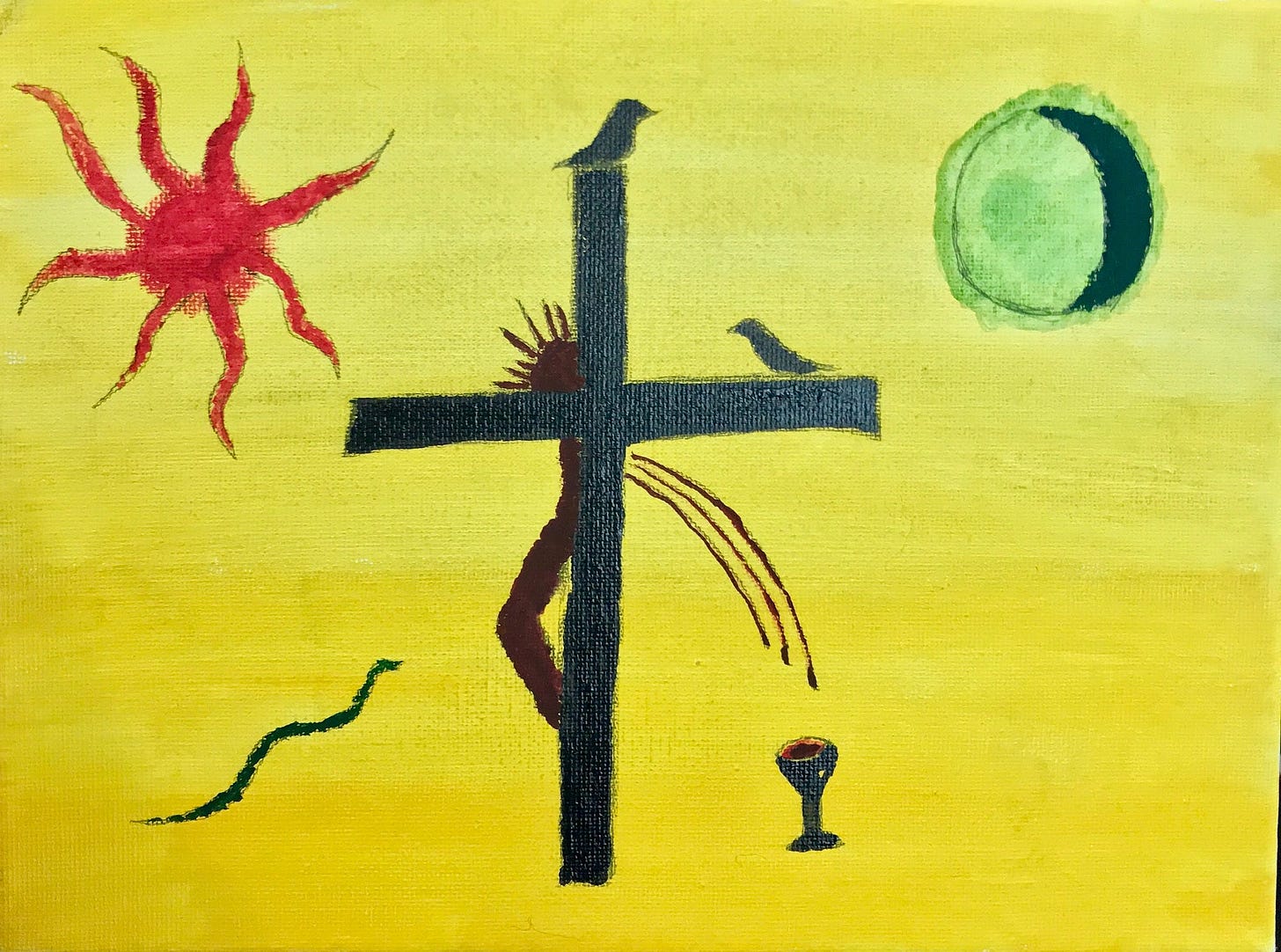Colossians 3.1-11
I am a Christian because one Sunday, at an ordinary church in the suburbs of Richmond, after several months of conscripted worship attendance, I came forward down the sanctuary aisle where a bland but kindly-looking middle-aged man named Steve, who was about thirty pounds beyond a Dad-bod and who wore a royal blue polo shirt, stood next to a small African-American woman holding a cup and offered me a torn piece from a loaf of Hawaiian bread and in that slight moment of receiving— suddenly— the hands holding out the bread to me were not Steve’s hands at all for Steve’s hands did not have holes in them.
The face— for an instant— was the face of another.
Neither did the voice for seven short syllables belong to Steve.
Steve was no longer Steve.
Yet Steve was also somehow more Steve than the Steve I knew.
The preacher had been speaking the truth that Sunday. The Risen Christ really was the host of the table. The encounter so unsettled me that I skipped past the chalice and sat down in a frightened, astonished daze.
“What if it’s true?” I remember muttering under my breath, “What if it’s all true?!”
On the one hand, I realize it’s crazy to claim that for several seconds before me Steve Chiocca was both Steve Chiocca and yet simultaneously also Mary’s boy and Pilate’s victim. For moments less than a minute long, Steve the Sunday school teacher and Christ “the firstborn from the dead” were coincident with one another. On the one hand, I am open to the possibility I imagined it and that I have since deluded myself about the memory.
On the other hand, such a strange and sudden coincidence is not at all astounding. It is sheerly the straightforward claim of scripture, “For you have died, and your life is hidden with Christ in God.” Why should the Lord Jesus not have appeared in Steve’s stead? After all, the real Steve Chiocca, the Steve as he will be revealed when Christ appears, already exists with Christ in God in such an inseparable way that Steve and Jesus are mutually identified with each other. “For [Steve has] died, and [his] life is hidden with Christ in God.”
Karl Barth says Colossians 3.3 is “the basic Pauline perception…which is that of all Scripture.”
“Hidden with Christ in God” is how scripture sees all of reality.
One summer afternoon during seminary I ran into the actor Russell Crowe. I was walking my dog and he was in town filming A Beautiful Mind. “Nice dog,” he said, squatting down to pet Quincy. It took me a moment to recognize the actor as he was costumed as the famous Princeton mathematician John Nash. Realizing the famous actor— my man crush, in fact— was standing in front of me, wanting to chat, I became suddenly articulate and charming.
“Uh…” I said.
And then I start to laugh uncontrollably.
And then I watched as Russel Crowe slowly backed away from me, the crazy street person he had unwisely engaged on the sidewalk.
The film A Beautiful Mind begins by recalling John Nash’s impressive start to his career and his fortuitous launch as a man, flourishing in a prestigious post at M.I.T and marrying a good and beautiful woman named Alicia.
After his auspicious start, suddenly schizophrenia disables Nash and the audience discovers that several of the characters in Nash’s life have existed only in Nash’s head.
Shock treatments and antipsychotic medications return him to outpatient life, yet they render him incapable of doing mathematics or making love to his wife. So Nash quits his meds and his delusional friends and fictitious persecutors return to him. In the film, Nash triumphs over his disability by learning to live with it, to live with his delusions as delusions and thereby to re-inhabit the real world. The decision to live with his delusions as delusions poses yet another difficulty for Nash; namely, he now has to learn how to distinguish delusion from reality. For instance, rather than indulge his delusions Nash has to learn to discern the difference between, say, the Russian agents pursuing him around Cambridge and that of his doctor, whom he initially takes to be one of his KGB antagonists. Nash even tells friends and colleagues to be on the lookout for his delusional behavior. Approached by a representative of the Nobel Committee, Nash asks a nearby student if she sees the stranger too. Just so, Nash’s delusions never leave him. His friends still appear to tell him that they miss him. And spymasters continue to appear and enlist him for his country’s service. None of these delusions go away; they simply no longer determine Nash’s other behaviors and beliefs.
In attempting to learn how to distinguish delusion from reality, Nash founders under the burden of an even more difficult problem. That is, how can you know that you truly know what is real? When the mathematician finally knows that the KGB agents pursuing him are not real, for example, the problem besets him how does he really know that this is so. Perhaps his insight into reality is but another delusion.
Critically, even with his beautiful mind, Nash cannot on his own establish reality. Reality must be unveiled to him from outside of him by another.
Thus, the final turning point in the film comes when Nash's wife, Alicia, says to him, “You want to know what's real?” And then she takes his hand and puts it to her face, and she places her hand to his, and she says to him, “This. This. This. This is real.”
We do nothing less than Alicia when we call scripture the word of God.
In a world ensnarled in delusions, today Jesus in his Spirit takes this word and places it in my mouth and against your ears and says to you, “This. This. This: For you have died, and your life is hidden with Christ in God…When Christ who is your life appears, then you also will appear with him in glory…Christ is all, and in all.”
This is real.
Critics of the faith will often allege that the church’s high Christological claims about Jesus developed centuries after Mary’s boy became Pilate’s victim. Such critics will thus distinguish between the Jesus of history and the Christ of faith, positing that the creedal tradition subsequently turned Jesus the itinerant teacher into Christ the incarnate Son of God and second person of the triune identity. The unbelieving New Testament scholar Bart Ehrman has a book whose title captures this very assumption, How Jesus Became God. In other words, the first Christians had a relatively low understanding of Jesus (rabbi, prophet, messiah— identifiable with God in some general way) and only much later did the church articulate the high view of Christ confessed in the creed:
“I believe in one Lord Jesus Christ, the only begotten Son of God, born of the Father before all ages. God from God, Light from Light, true God from true God, begotten, not made, consubstantial with the Father; through him all things were made.”
Jesus of history versus the Christ of faith.
And it’s not simply a scholarly prejudice but it’s the presupposition held by many lay people. Hundreds of years after Easter, for political reasons all its own, the church came along and complicated the simple faith of the first Christians. I don’t know how many church people I’ve heard advance that sort of argument. Or still another— the notion that the Trinity is an extra-biblical doctrine rather than the proper name of the God disclosed by the Bible. The ubiquity of these kinds of arguments is frankly amazing given the staggering claims scripture straightforwardly makes about Jesus.
There is absolutely nothing in the Nicene Creed that avows anything more astounding and mysterious about Jesus Christ than what you will find in the Letter to the Colossians.
The creeds are merely the church’s attempt to say systematically what Paul already said occasionally to the church at Colossae.
And the Epistle to the Colossians predates Matthew, Mark, Luke, and John.
Prior to the church possessing the Gospels, Paul was already citing breathtaking claims about Jesus:
“He is the image of the invisible God, the firstborn of all creation. For by him all things were created, in heaven and on earth, visible and invisible…all things were created through him and for him. And he is before all things, and in him all things hold together.”
In other words—
The claim Colossians makes about our fundamental reality (“Your life is hidden with Christ in God”) is not a later addition to the faith; it is one of the first conclusions drawn by those who personally knew Jesus.
The claim Colossians makes about our fundamental reality (“Your life is hidden with Christ in God”) is not a later addition to the faith; it is one of the first conclusions drawn by those who personally knew Jesus.
And on its face, with merely a surface reading, this word is grace and good news.
Your life is right now, already and always, hid with the Son in the Father.
Tell that to the voice inside your head!
Tell that to your ex-husband!
Say it over yourself when you survey the wreckage of your life!
That life, your life, is right now, in spite of appearances, already and forever, hid with the Son in the Father.
That’s what’s real.
Just so, the determining factor in your life is not your past— you have died. The determining factor in your life is not your present— good or bad, saint or sinner, you have died. What defines you is your future, a future that is already presently established though hidden.
Your life is concealed with Christ in God.
This is real.
This is grace and good news.
But we’ve still not scratched the surface or said all that scripture here says about what is real.
Listen again to the passage in a literal, less-polished translation of Paul’s Greek:
“For you have died, and your life has been hidden with Christ in God. Whenever Christ might become manifest—your life—then you yourselves will also become manifest with him, in glory…in this condition there is no Greek and Jew, circumcision and uncircumcision, barbarian, Scythian, slave, free person. Rather, here all things are Christ and in all things is Christ.”
When Christians confess that the true and living God is a triune identity, we mean that there is nothing more to God the Father but as the Father of this Son, Jesus. There is no mysterious God lurking behind the Father of the Lord Jesus. And there is nothing else to God the Son but this Jesus who calls God Abba, Father. Finally, there is no Spirit that is Holy other than the love exchanged between the two, a love that is the power of the Future.
Father, Son, and Holy Spirit.
They self-determine their identities according to their relations with each other.
Karl Rahner was a 20th century Catholic theologian. Someone once asked him what he thought of infants whose priests had baptized them not in the name of the triune God but under the attributes Creator, Redeemer, and Sustainer.
Rahner replied:
“Well, I’m sure the children are saved but I’m certain their priests will be damned.”
Rahner was pointing to the inseparability of the relations. Father, Son, and Holy Spirit are not functions. They are identities that cannot be known apart from their mutual relationship. But now, more mysterious still, into this three person’d relationship, scripture inserts still another— you:
“For you have died, and your life has been hidden with Christ in God. Whenever Christ might become manifest—your life— then you yourselves will also become manifest with him, in glory.”
Notice:
Colossians makes Christ synonymous with you— “your life.”
It’s like Paul is saying, When I say Christ I mean you. When Christ is revealed, you will be revealed too. No, it’s even more astonishing. Paul is claiming that you cannot appear at all in glory unless Christ appears and Christ cannot appear in glory apart from, without you.
Father, Son, and Holy Spirit.
And You.
Paul points to a mutual manifestation because your life is hidden with Christ in God. These are the things above that Paul implores you to ponder. There is no Father without the Son. There is no Spirit without the Father of the Son. And there is no Son— and so no Father or Spirit— without you.
As good and gracious a word as it is, scripture is saying something far more than that your life is hid with Christ in God. It’s saying that which seems impossible to say. It’s saying that God's own life is bound up with ours. Your life is already with Christ in God. And when Christ is revealed, you too will be revealed. Christ’s life and your life are so bound together, one cannot appear without the other appearing. What’s more, they both appear through one another.
Quite simply—
There is no God without Christ.
And there is no Christ without the world.Because Christ is the life of you.
And you.
And you.
And you…
Ad infinitum.
As Karl Barth says:
In Jesus Christ God has elected not to be God without you— literally.
This is real.
“Whenever Christ might become manifest—your life—then you yourselves will also become manifest with him, in glory.”
Christ is himself and also at once our life, Colossians clearly says.
Which is to say, Christ is not life first in some generic fashion before he elects to identify with us and therefore becomes our life. Christ is our life; that is, his very being is already our life and the life of all things, which is where the passage winds up in verse eleven where Colossians claims that what will one day be manifested to us is not only that all things are in Christ but that all things are Christ.
All things are in Christ.
All things are Christ.
Everyone that you meet, everything that is, all in your life is Christ.
Your life is hid with Christ in God because Christ is in you and Christ is you.
This is real.
In the Gospel of Mark, during his final week, Jesus eavesdrops on an argument between some scribes. “Which commandment is the most important of all?” Jesus repeats their question. And then Jesus answers the question they did not ask him, “Hear O Israel, the Lord your God, the Lord is One. And you are to love the Lord your God with all your heart, mind, soul, and strength, and love your neighbor as yourself.”
Love God.
And love your neighbor as yourself.
This is good Jesus of History terrain, we think. This is Jesus the Teacher before the church came along and made him the Christ of faith, we think— Jesus before we make him God.
Except, even before the Gospels, Colossians makes it clear that it is a profound mistake to separate these commands into two commands. Christ complicates these commands in such a way as to make them a single command.
Your neighbor’s life is hid with Christ in God.
Your enemy’s life is hid with Christ in God.
Your life is hid with Christ in God.
All things are in Christ.
All things are Christ.
Therefore—
There is no loving God that is not also loving your neighbor.
There is no loving God that is not loving your neighbor with the love with which God loves God. There is no loving your neighbor that is also not received as love by the God in whom that neighbor is hidden. You cannot treat your neighbor badly without knowing that you’re doing it to the Son of God. This is what the Book of Hebrews means when it laments that “They are crucifying once again the Son of God.” The two loves are ultimately one love because Christ is in all things and becoming all things.
In other words—
You are even worse off than the delusional mathematician.
At least, John Nash knew he was crazy.
But you might not have known until just now when the Holy Spirit told you— you might not have known that what you take to be the real world isn’t.
And every day you are surrounded by people who are not as they appear to you.
You may as well have been treating them like delusions given the fact that, in reality, they are Christ.
In his Nobel Prize address, John Nash speaks of his lifelong quest for the reasons of things, for the mathematically formulable underlying dynamic of economic and analogous behavior, for a metaphysics of physics to discipline his madness, for the reasons madness itself provided.
He says:
“I've always believed in numbers; and the equations and logics that lead to reason. But after a lifetime of such pursuits, I ask "What truly is logic? Who decides reason? My quest has taken me through the physical, the metaphysical, the delusional -- and back. And I have made the most important discovery of my career, the most important discovery of my life: It is only in the mysterious equations of love that any logic or reasons can be found.”
And then Nash looks up from his address and looks directly at his wife, Alicia and says, ”You are my reasons.”
Love is the criterion of reality.
Since Russell Crowe and I are friends I went to see the movie in the theater, and I remember that was the moment in the film when the audience wept audibly. Accordingly, it’s important to point out that what Nash says about the mysterious equations of love is utter sentimentality— its pure nonsense— if our lives are not hidden in the God who loves another as himself.
What Nash says about the mysterious equations of love is utter sentimentality— its pure nonsense— if our lives are not hidden in the God who loves another as himself.
This is real.
In the film, the deluded man’s wife does not simply affirm her love. She made him touch her. She takes his hand and she puts his hand to her face, and she places her hand to his hand, and only then does she say to him, “This is real.”
Love that is not embodied is a mere figment.
There is no love without embodiment.
Just so—
Even though it’s the word of God, it’s not enough for Colossians to assure you that “Your life is hidden with Christ in God.”
Love requires more than words.
So come to the Table.
Here, like Alicia to John, the Love with which you are loved makes himself an object in your hands and on your lips. He says to deluded you, “This is my body. This is my blood.” In receiving him, he becomes hidden within you just as you are already hidden with him in God.
This.
This.
This.
This is reality.


















Share this post